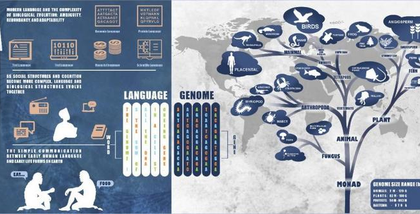Large language models can accurately predict plant gene functions: Study
By IANS | Updated: June 1, 2025 18:08 IST2025-06-01T18:01:48+5:302025-06-01T18:08:08+5:30
New Delhi, June 1 Large language models (LLMs), when trained on extensive plant genomic data, can accurately predict ...

Large language models can accurately predict plant gene functions: Study
New Delhi, June 1 Large language models (LLMs), when trained on extensive plant genomic data, can accurately predict gene functions and regulatory elements, researchers said on Sunday.
This advancement holds promise for accelerating crop improvement, enhancing biodiversity conservation, and bolstering food security in the face of global challenges, said the study published in Tropical Plants journal.
Traditionally, plant genomics has grappled with the intricacies of vast and complex datasets, often limited by the specificity of traditional machine learning models and the scarcity of annotated data.
While LLMs have revolutionised fields like natural language processing, their application in plant genomics remained nascent. The primary hurdle has been adapting these models to interpret the unique "language" of plant genomes, which differ significantly from human linguistic patterns.
In this study, researchers explored the potential of LLMs in plant genomics.
By drawing parallels between the structures of natural language and genomic sequences, the study highlights how LLMs can be trained to understand and predict gene functions, regulatory elements, and expression patterns in plants.
The research discusses various LLM architectures, including encoder-only models like DNABERT, decoder-only models such as DNAGPT, and encoder-decoder models like ENBED.
The team employed a methodology that involved pre-training LLMs on vast datasets of plant genomic sequences, followed by fine-tuning with specific annotated data to enhance accuracy.
By treating DNA sequences akin to linguistic sentences, the models could identify patterns and relationships within the genetic code.
These models have shown promise in tasks like promoter prediction, enhancer identification, and gene expression analysis. Notably, plant-specific models like AgroNT and FloraBERT have been developed, demonstrating improved performance in annotating plant genomes and predicting tissue-specific gene expression.
However, the study also notes that most existing LLMs are trained on animal or microbial data, which often lack comprehensive genomic annotations, showcasing the versatility and robustness of LLMs in diverse plant species.
In summary, this study underscores the immense potential of integrating artificial intelligence, particularly large language models, into plant genomics research. The study was conducted by Meiling Zou, Haiwei Chai and Zhiqiang Xia’s team from Hainan University.
Disclaimer: This post has been auto-published from an agency feed without any modifications to the text and has not been reviewed by an editor
Open in app